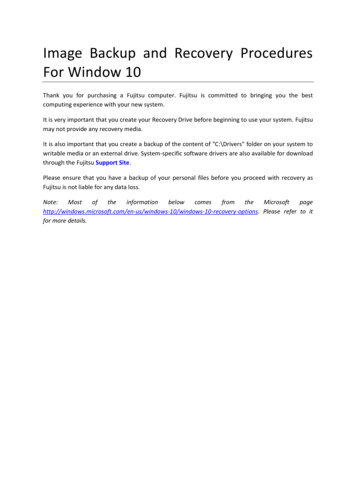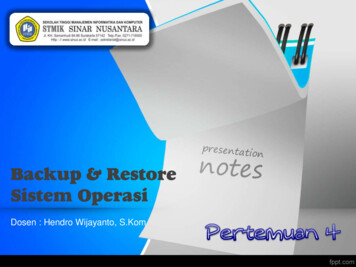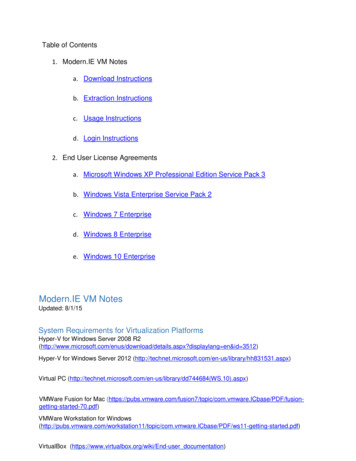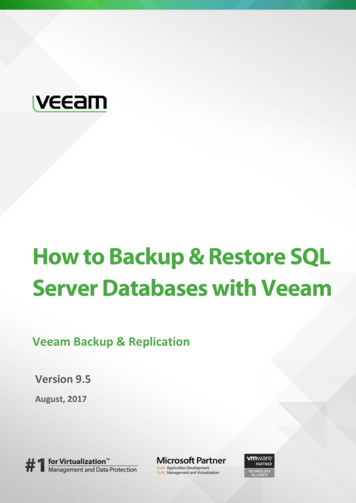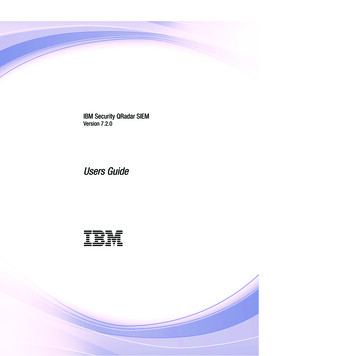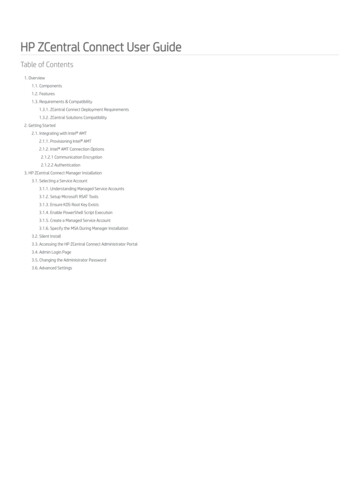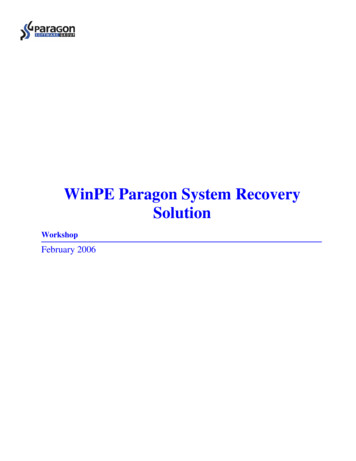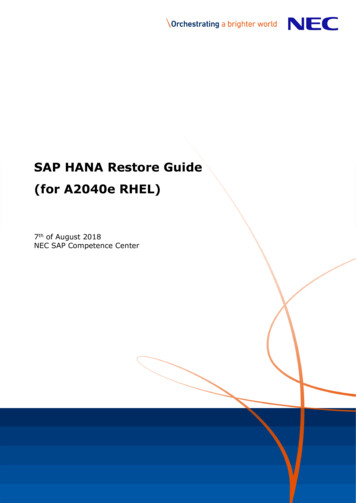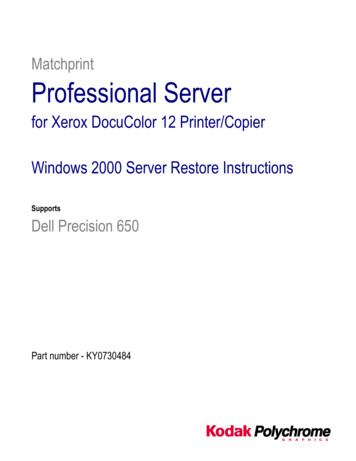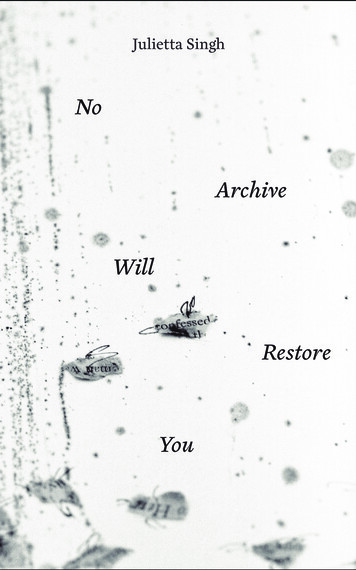
Transcription
no archive will restore you
Before you start to read this book, take this moment tothink about making a donation to punctum books,an independent non-profit press@ https://punctumbooks.com/supportIf you’re reading the e-book, you can click on the imagebelow to go directly to our donations site. Any amount,no matter the size, is appreciated and will help us tokeep our ship of fools afloat. Contributions from dedicated readers will also help us to keep our commonsopen and to cultivate new work that can’t find a welcoming port elsewhere. Our adventure is not possiblewithout your support.Vive la Open Access.Fig. 1. Hieronymus Bosch, Ship of Fools (1490–1500)
no archive will restore you. Copyright 2018 by Julietta Singh.This work carries a Creative Commons BY-NC-SA 4.0 International license, which means that you are free to copy and redistribute the material in any medium or format, and you may also remix, transform andbuild upon the material, as long as you clearly attribute the work to theauthors (but not in a way that suggests the authors or punctum booksendorses you and your work), you do not use this work for commercialgain in any form whatsoever, and that for any remixing and transformation, you distribute your rebuild under the same license. irst published in 2018 by 3Ecologies Books/Immediations,an imprint of punctum books.https://punctumbooks.comISBN-13: 978-1-947447-85-1 (print)ISBN-13: 978-1-947447-86-8 (ePDF)lccn: 2018958567Library of Congress Cataloging Data is available from the Library ofCongressBook design: Vincent W.J. van Gerven OeiCover image: Simryn Gill, Let go, lets go (2013). Courtesy of the artist.
Julietta SinghNoArchiveWillRestoreYou
ContentsA Thief, a DesireNo Archive Will Restore YouThe Body ArchiveThe Inarticulate TraceOther WomenThe Ghost Archive152129578195
The starting-point of critical elaboration is the consciousnessof what one really is, and is “knowing thyself” as a product ofthe historical processes to date, which has deposited in you aninfinity of traces, without leaving an inventory . Thereforeit is imperative at the outset to compile such an inventory.— Antonio Gramsci
AcknowledgmentsThis book could not have done without the friendship,insights, and interventions of: Lisa Smirl, Julie Penner,Cecily Marcus, Sapana Doshi, Ann Pellegrini, Katie Gentile, Jack Halberstam, Macarena Gómez-Barris, AaronCarico, Allyson Rainer, Susan Wolver, Justin Linds, JesseGoldstein, Arran Gaunt, Molly Fair, Cara Benedetto, JagatN. Singh, Christine Common, Giovanni Geremia, and Renate Singh.Eileen Joy and Vincent W.J. van Gerven Oei embraced thisoddball text and offered it a home in the radical land ofpunctum books. For this remarkable fact, and for beingthe most badass publishing duo, I thank them so truly.Then one extraordinary day Erin Manning floated intomy world, followed by Brian Massumi, who together understood everything. For simply being, and for foldingthe book into their 3Ecologies series at punctum, my loveand thanks are endless.Several amazing women shared their sensitivity and enthusiasm for this book at various stages: Thank you especially to Maggie Nelson, Nuar Alsadir, and Orla Mc Hardy.An enormous thanks to Barbara Browning for her sup-
port, and for offering a reader response to this book inthe form of a weird and wonderful meditation that let mesee the book in strange new ways. Thank you to SimrynGill for permission to use her gorgeous work as cover artfor this book.I am forever and infinitely thankful to Nathan Snaza,who quite simply holds the world together: for fabricating time and space, for reading me endlessly, for all theseyears of unbelievable friendship. And to Isadora Singh– herself a stunning little archive – always gathering upand transforming every little thing, including me.No Archive became manifest through magical encounterswith my misfit wonder, Silas Howard. For your infinite inspiration and your extraordinary sensitivity in the world,this book is for you.
A Thief, a DesireIt was 2004 and unapologetically frigid in Minneapolis. The radio had pronounced it the coldest day of theyear, though I had learned by then to trust nothing thatcame from news channels. The heat in my studio apartment was out again, and I was bundled indoors in woollysocks, long johns, and a bulky coat watching my breathbillowing out of my body in smoky plumes. My buildinghad been robbed twice within the past week, though myapartment had been magically spared. This is not quitetrue, because the intruder had in fact come to my doorand taken from my doormat my sole pair of sneakers. Hehad been at the threshold, not quite inside my home butat its border. And he had taken something from that borderland, something that held value for us both. In thissense, it seemed to me that we were undeniably linked.Despite the fact that he had not entered my space, I couldfeel him palpably inside – not only in the fearful sense ofanticipating his return, but in the sense that some traceof him had been left behind, had made its way across thethreshold and into that tiny frozen space that had become my makeshift American home.Anticipating that the thief would strike again, I searchedthe apartment trying to evaluate what else of mine mightbe seen as valuable to him. Attempting to abate my fear,15
no archive will restore youI decided the ethical move was not to defend against himbut to find a way to welcome him, to make his forced entry feel less violating. I put a post-it note in the fridgeaffixed to a can of Red Bull that read Please Feel Free. Thenote was a strange welcome to my unwanted intruder;an offering of something that it would not hurt me tolose. In fact, the Red Bull was the remnant of some othervisitor, someone I had already forgotten who had left behind an item I would never consume. I knew there was anethical flaw at work in my act of strange hospitality, ofoffering something to my intruder that I myself did notwant. I was deep in self-critique even before the stickyhad stuck; I was young and cold and could feel my bodyaging.As a brown Canadian kid, I had imagined America as atwo-headed monster. One head was a gleaming blondhaired boy with a mouthful of exotic American candies, abig perverse smile chewing unrelentingly. The other headwas cloaked in the clownish headgear of the Ku KluxKlan.I found both heads silly and terrifying; both in differentways seemed to want to devour me.I came to the United States to study, urged by keen Canadian professors that a PhD in hand from an Americanuniversity would make me “golden” upon return. I camewith hesitancy, never once considering that I might notreturn, that moving south would over time transform meinto an expatriate. When that frigid day in Minneapolishad come to pass, I had been living in America for monthsand no longer envisioned the nation as a monster. In fact,I had grown to love monsters, recognizing their socialfunction as the abject edges of society. The creation of themonster, I had discerned, is a way of crafting an outsideso that a collective can imagine itself as bounded, cohe16
a thief, a desiresive, and impenetrable. The monster is a being who willnot or cannot fit normally, whose existence makes others uncomfortable and who therefore must be shunnedand exiled. No, America was not a monster, though it washighly skilled at creating monstrous figures and exertingforce against them. My intruder-guest felt like a monster– like something lurking at the edges of what I had cometo believe was properly mine. Something that threatenedto come inside, and in so doing to force me to reckon withmy relation to it.Waiting to be robbed is like waiting for an imminent accident in which both you and your assailant are togetherin disaster. Your assailant in that single moment wieldsmore control, and in response you become in a senseother to yourself. You cannot uphold the usual fantasy ofbeing a self-governing body; you are palpably exposed. Iresponded to this crisis of being by doing what I alwaysdo in moments of critical uncertainty. I did what I hadcome to America to do: I studied.I constructed a makeshift nest on my ratty old orangesofa, aesthetically a cross between a bus seat and a churchpew. The cushioning inside was endlessly disintegrating,leaving piles of dust beneath it that spread across thefloor like a listless diaspora. But I loved the look of thatsofa and in any case had no funds to replace it. I was burrowing myself between blankets, flipping through thepages of a foundational work of postcolonial studies, Edward Said’s Orientalism, when I came upon a passage written by the Italian neo-Marxist political theorist, AntonioGramsci:The starting-point of critical elaboration is the consciousness of what one really is, and is “knowingthyself” as a product of the historical processes todate, which has deposited in you an infinity of trac17
no archive will restore youes, without leaving an inventory Therefore it is imperative at the outset to compile such an inventory.1An infinite history of traces without an inventory! Anendless collection of oneself that is impossible to gather I had no concrete idea of what it meant, or what currency it had in my own life, but I knew how it felt. It feltas though the broken thing I was might be restored, andit felt like an embodied idea I would never stop desiringfor myself and for the world.The heat kicked back on in the middle of the night. I couldhear the strange clanking of the radiators fumbling backto life. But by then, it was not the double threat of freezing and burglary that left me sleepless, but the opaqueand desperately seductive idea of my own impossible archive.118Antonio Gramsci, Selections from the Prison Notebooks, ed. QuintinHoare and Geoffrey Nowell Smith (New York: International Publications, 1997), 324. Cited in Edward Said, Orientalism (New York: Vintage, 1979), 25.
a thief, a desireThere are at least two ways to understand the emergence of a desire: one is through a moment, when something shifts and the way you act and react, the way youturn things over, is fundamentally altered. The other isthrough accrual, how over time and repetition our histories draw us toward certain practices and ways of feeling and wanting. My desire is the idea of the archive. Or,more accurately, it is the idea of what the archive mighthave to offer. While I know that my desire for the archiveis in reality a long accrual, I imagine it as this single solitary moment.19
No Archive Will Restore YouWe were scrambling toward the archive. We knew it wascrucial, but I suspect that few of us knew what it meant,or where it was, or what to do with it.We were graduate students in a small cultural theory program, plummeting deeper and deeper into debt, which isin a sense its own hellish kind of archive. We were hopingto be one of the rare exceptions that would be pluckedinto that almost mythical land of tenure-track work. Thejob market had undeniably tanked, and a PhD had radically changed over time from being a gateway into stableacademic employment to being a credential with almostno real currency in the world. As the university becamemore and more corporatized and increasingly driven byexploited labor, it was also churning us out in droves,spitting us into a world of highly competitive and highlyunstable employment.Most of us would become underpaid adjunct laborerswithout access to healthcare, facing our mid-30s withouta clear sense of what it had all been for. We told ourselvesthere was nothing else we would rather do than to study,to be trained into cultural critique over the course of adecade. And it was mostly true. We were trying to stay insolidarity with each other as we competed for scarce fel21
no archive will restore youlowships and dwindling jobs, watching the cohorts aheadof us fail to live out the promise of it all, wondering inmore and less public ways why we had started down thisanxiety-riddled road in the first place.Why did we stay on, with the odds so stacked against us?I don’t blame the archive per se, but it undoubtedly heldout a kind of promise for each of us that kept us tethered to academia. The archive was an elusive hope of ourindividual salvation. If we could find the right archive,the right stash of materials that was sexy enough to sellourselves, we could be spared the depression, the anxietyattacks, the pre-mid-life crises that would come when,one by one, we realized we were not going to be chosen.When, in the face of that brutal rejection, we had no ideawhat the fuck to do with ourselves. If only we could stumble upon the right archive, the secrets that no one elsehad yet discovered, we might still be one of the chosenones. The archive was an opaque hope, yet it kept slippingaway as though it didn’t want to be found, plundered, excavated. It became outright seductive in its evasiveness,and it kept making clear that it didn’t want our masturbatory desire for it. The archive was pure tease, and wewere unabashedly shoving borrowed dollar bills down itsskimpy thong.If you are like me and you didn’t roll into graduate schoolknowing the highfalutin importance of the archive, youlearn it the moment you step into the seminar room.There, everyone is required to pretend to have one, andeveryone wants to know yours. “What’s your archive?”you’ll be asked repeatedly, and your answer will revealhow seriously you should be taken. You learn quickly that“archive” in this context can mean almost anything. In itsmost obvious iteration, the archive might be a physicalplace where a collection of documents is housed.22
no archive will restore you(It behooves me here to admit that I have almost no experience of the brick and mortar archive, that in fact Ihave a long history of becoming discomfortingly overwhelmed in spaces that contain masses of information.Since childhood, I have felt like a shrunken mind thatknows too little, that cowers like a beaten dog each time Iam confronted by vast architectures of knowledge.)But “archive” has more expansive meanings too, whichcan signal a body of literature (as in the literature of agroup of politically motivated writers in South Asia between the 1930s–1960s), or a series of monuments, or acollection of images In other words, “archive” in graduate school simply means what you are studying, and calling what you study an “archive” gives it heft, grants itthe status of an intellectual pursuit. Your archive is anexpected declaration – a pronouncement that makesmanifest your worth and belonging in the great hallsof higher learning. The archive, it must be noted, is alsoyour enabling fiction: it is the thing you say you are doingwell before you are actually doing it, and well before youunderstand what the stakes are of gathering and interpreting it.23
no archive will restore you“Nothing is less reliable, nothing is less clear todaythan the word ‘archive,’” writes Jacques Derrida,1 whobegins his meditation on the archive (and its particularrelation to psychoanalysis) by turning us to arkhē, thelinguistic root of the word. Arkhē, Derrida explains, articulates both commencement and commandment. Inthe first iteration, arkhē is the place from which everything emerges, the location from which the thoughts andthings of the world spring forth. In the second, it is theplace of authoritative law, from where authority is exercised and externalized. How, the philosopher asks, canwe hold these two meanings together? What is this place– the archive – where the beginning of things and theauthority to govern over them both emerge? For Derrida,the archive is troubling; it marks a series of secrets between the public and the private, but also and most intimately, “between oneself and oneself.”2Early in his famous book Archive Fever, Derrida worriesover the novelty and value of his meditation on the archive, pausing to confess from the outset thatin the end I have nothing new to say. Why detainyou with these worn-out stories? Why this wastedtime? Why archive this? Why these investments inpaper, in ink, in characters? Why mobilize so muchspace and so much work, so much typographicalcomposition? Does this merit printing? Aren’t thesestories to be had everywhere?3Derrida’s rumination on the archive turns out for him tobe an irresolvable problem from which a whole host of12324Jacques Derrida, Archive Fever: A Freudian Impression, trans. Eric Prenowitz (Chicago & London: University of Chicago Press, 1996).Ibid., 90.Ibid., 9.
no archive will restore youintellectual projects sprung forth. Did they offer something new? Did they merit printing? Whether or not thisproliferation of Derridean archival engagements werethemselves useful expenditures I cannot say. To be sure, Ihave never understood how to constitute usefulness. Butmost certainly they became part of the archive’s archive,marking a moment in intellectual history when noneof us understood the archive, and none of us could stopreaching for it.Is it too bold to say that the time of the archive haspassed? The archive as an intellectual desire seems bynow to be cliché. Cliché. A senior professor in graduateschool once told me off-handedly that “cliché” is a Frenchonomatopoeia, originating from the sound produced bya particular kind of printing. The sound of something being repeatedly reproduced. Our professional relationshiphad briefly turned into a silly affair – something entirelypredictable and utterly foolish. As I watched his mouthsound out the definition of cliché, I wondered if he knewthat he was commenting on our relational breach.Years later when I confessed with deep shame to a feminist mentor that I had done something so utterly clichéas having an affair with a male professor, she replied: “Butof course it’s cliché! It’s cliché because it is continuouslyreproduced! You are part of a reproductive machine!” It isa story that is “to be had everywhere,” the gendered power dynamics of intellectual mentorship. I was fully awareand critical of these dynamics, and fully reproducedthem while imaging myself as unique. Just as our archivalchase seems to reproduce a structure of knowledge overand over and over again.25
no archive will restore youWhen an archivist friend recently visited my home,she noticed stacks of books on the archive scatteredabout the living room and asked me pointedly over myinvestment in it. She had just returned from a radicalarchivist conference in Oregon, where archivists decriedthe scholarly preoccupation with the site of their impassioned labor. For them, the critique of the archive’s gapsand silences fails to account for their low wages, and forthe lack of accessibility to some of the materials theymost want to gather. What’s more, my friend declares,they are also affronted by the lack of scholarly attentionto the archivist’s own ideas.In the face of the archivist’s frustration, how do I respond? Writers often balk in those moments when theymust explain in quick snippets what they are writingabout. We work in words yet struggle to make languagecapture our engagements. I am someone who writes tounderstand what I think; I write what I do not yet knowhow to place into language and thought.Confronted with the archivist’s frustration, I respondawkwardly that my interest in the archive is more creative than intellectual. This is a lie, since I cannot parsethe difference between these modes. I say, also, that mypassion for the archive is rooted in the suspicion that itstime has passed; it feels already like an intellectual remnant.If the archive is a remnant, it is one that keeps whispering to me, insisting on its place in my everyday life. WhatI might have said to her instead is this: “I am a disquietedarchive that fumbles in words. A thing made up of infinite, intractable traces.”Or, I might simply have said: “The archive is a stimulusbetween myself and myself.”26
no archive will restore youC had just returned from a year of research in Argentina when I met her in my first year of graduate school.She had a no-nonsense sensibility and a rare brisk walking pace that perfectly matched my own. She was severalyears ahead of me in her PhD, writing about Argentinewomen who, as political prisoners during the last dictatorship, stored subversive literature in their vaginal canals. She called this “the vaginal library.” Both metaphorand place, the vaginal library seemed to me an embodiedarchive in organic ruin. It brought the notion of “preservation” into the cell in a doubled sense: into those cagesthat imprisoned women, and into the cellular structuresof their bodies.Truth be told, I have never once since then heard theword “archive” without thinking immediately of dissenting vaginas. These two things – archive and vagina– have become sutured in my thought.I learned from C about these dissenting Argentine women just after the building burglaries, after I had stumbledon Gramsci’s summons to compile an inventory of historical traces. It was then that I started to wonder overmy own body as an impossible, deteriorating archive – abody that had across my life felt both excessive and insufficient, oftentimes even monstrous. Abandoning thepursuit of a legitimate archive – one external to me andone that might ensure my professional success and upward mobility – I began instead to dwell on the messy,embodied, illegitimate archive that I am.27
The Body ArchiveWhy this desire for a body archive, for an assembly ofhistory’s traces deposited in me? (I worry over how todescribe it, how to frame it without sounding banal orbafflingly idiosyncratic.) The body archive is an attunement, a hopeful gathering, an act of love against the foreclosures of reason. It is a way of knowing the body-self asa becoming and unbecoming thing, of scrambling timeand matter, of turning toward rather than against oneself. And vitally, it is a way of thinking-feeling the body’sunbounded relation to other bodies.I begin then to compile an archive of my body, an activitythat from the start feels discomfortingly intimate. Toointimate and too bewildering an undertaking, becauselike all other bodies mine has become so many thingsover time, has changed dramatically through forces bothnatural and social. I am also, it must be noted, a personwhose body has been broken and maimed many timesover – a fact that I cannot yet entirely account for.How, then, to undertake this desired body archive? Thereare, of course, those obvious places that are marked onthe body, places where the body has been cut, or burned,or broken. I could begin simply by cataloguing these inflictions through the traces they have left behind. Just29
no archive will restore youas easily, I could also turn to my body’s naturally occurring oddities, the ways that it has grown and developedagainst perceived social norms. Both approaches emphasize the body’s surface, and both dwell on its “imperfections” – those aspects that we (especially those of ustrained as women) see magnified so acutely that whenwe look at ourselves we see not body but flaw, not thehistories that produced us but a catalogue of deficiency.While these topographical oddities may indeed becomepart of my archive, they cannot constitute its core. Thisis in part because I do not want to gather a body archivestrictly in order to convert culturally produced deficiency into historical value; to begin to love, in other words,what I have been trained to perceive as flaw.There is an archival crisis already looming here, becausethe body’s surface is ultimately not stable ground uponwhich to build an archive. While the skin is a visual signof the body’s exterior limit, the physicist Karen Barademphasizes how in fact bodies extend into space well beyond the skin. Molecularly, we spread into the “outside”world, mingling with it in ways that are not apparent tous. Our bodies are porous, as Nancy Tuana reminds uswhen she calls into question “the boundaries betweenour flesh and the flesh of the world.”1 These feminist formulations of the body insist on our vital entanglementswith the outside world, complicating any easy binary demarcations of “inside” and “outside.” For better and forworse, we are made up of an outside world which constitutes, nourishes, and poisons us in turns.130Nancy Tuana, “Viscous Porosity,” in Material Feminisms, eds. StacyAlaimo and Susan Hekman, 188–213 (Bloomington: Indiana University Press, 2008), 198.
the body archiveThis is not only a material problem for my body archive,but also an affective one. In the end, we are not bounded,contained subjects, but ones filled up with foreign feelings and vibes that linger and circulate in space, that enter us as we move through our lives. We likewise leavetraces of ourselves and our own affective states (whichare never really just our own) behind us when we go. After all the discipline we have endured to teach us thatwe are self-governing and self-contained, responsible forhow we feel, Teresa Brennan insists that “the taken-forgrantedness of the emotionally contained subject is a residual bastion of Eurocentrism in critical thinking.”2 Howwe think about ourselves as material and emotional beings turns out to be a style of thought, one that emergesfrom a specific place (Europe) at a specific time (modernity). Against this historically imposing style of thought,I am fully invested in the conviction that our bodies andminds are less discrete than we have been led to believe.Bodies and minds: I confess, I have already lost the difference between them.There is something haunting to me about the fact that Ilean on contemporary feminist new materialist discourseto account for the fact that the body is not and has neverbeen singular. Something haunting about the fact thatthe non-singularity of the body, its vital entanglementswith other kinds of bodies, was once so obvious acrosscultures, geographies, and histories that it didn’t need tobe argued. Something changed, something was changed.A monumental worldview swept in and tried – with bruteforce, with discipline, with pedagogy – to make us eachone self. But there is a prolific past that tells a differentstory of the body as an infinite collection of bodyings.And the grand historical force of producing the singular2Teresa Brennan, The Transmission of Affect (Ithaca: Cornell UniversityPress, 2004), 2.31
no archive will restore youself has made these pasts difficult to gather, difficult toarchive.Pondering the idea of the body archive, I cannot resistthinking toward those palpable bodily openings: the orifices. Those holes in our bodies where other bodies haveunabashedly entered and left their deposits. Amongother things, the body’s archive might be framed as anarchive of penetration. A cellular recounting of sloughsof skin, of bodily fluids that have been shed or excretedinto each body, into each of the body’s canals. A history,in other words, of foreign bodily matter left inside us. Inthis sense, the vaginal archive also turns out to be an analand oral and acoustic one Each orifice an entry wherewe palpably open, where other bodies have been, and byleaving their traces in us have, in a molecular sense, become us.This thought is at times distressing to me when I reflectupon a history of forced and unwanted bodily entry, or ofthose fleeting shameful affairs I have so often wished tomake disappear from my archive. I do not want to retainthose remnants, nor at times can I bear that to some degree, however infinitesimally, I am constituted by them.Lest I forget, though, that we also shed ourselves overtime. This body is not the body it was then and is alreadybecoming another body. This formula offers degrees ofrelief and panic in turn. It is also another kind of fiction.Suddenly I am aware of the body as both archive and archivist – in a crucial sense, it gathers its own materials.Control over the assemblage that I am turns out to bepure fantasy.32
the body archiveIn graduate school, I wrote a shoddy dissertationabout representations of food and eating in postcolonialliterary texts titled The Edible Complex. The title was itscrowning achievement, and even that was given over tome by my doctoral advisor. What is important to me nowabout that dissertation is that it is a sign of my historical preoccupation with what enters the body and howand why. With the ways in which we take in, refuse orexpunge things that are external to us. It was a noviceattempt to conceive an anti-colonial archive of ingestion,with special attention to how colonial legacies continueto inform our bodies and minds.The French gastronome Jean-Anthelme Brillat-Savarinonce famously pronounced: “Dis-moi ce que tu manges,je te dirai ce que tu es” (“Tell me what you eat, I will tellyou what you are”3). He claimed a critical relation between one’s identity and one’s diet, reminding us thateating habits reveal or betray so many forms of identity,including race, ethnicity, class, culture, gender. And also,perhaps, sexuality but I will come to that.There is a moment in an interview with Jean-Luc Nancywhen Derrida insists that it is inconceivable for a head ofstate in the Western world to be vegetarian today. Whathe means by this is that the top political dog must unabashedly consume other bodies in order to be seen as aneffective state leader. Eating meat becomes a sign of willingness to obliterate other beings. There’s a funny perversion at work in this formulation, if you think about it.The head of state becomes a kind of cannibal: he is onewhose carnivorous authority is a mirror of his capacity towillingly devour other humans.3Jean-Anthelme Brillat-Savarin, Physiologie du goût (Paris: Flammarion, 2001), 19.33
no archive will restore youYet in the fantasy of Western imperial power, the cannibal is never the self but the other, those “savage” subhuman beings whose cultural practices of eating otherhumans makes them legitimate subject
Before you start to read this book, take this moment to . which means that you are free to copy and redistribute the mate - rial in any medium or format, and you may also remix, transform and . the most badass publishing duo, I thank them so tr
